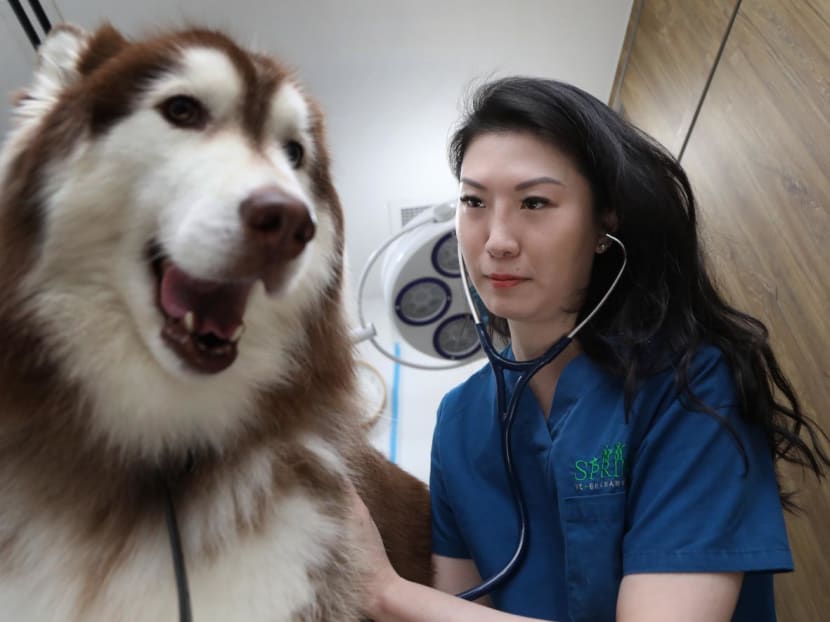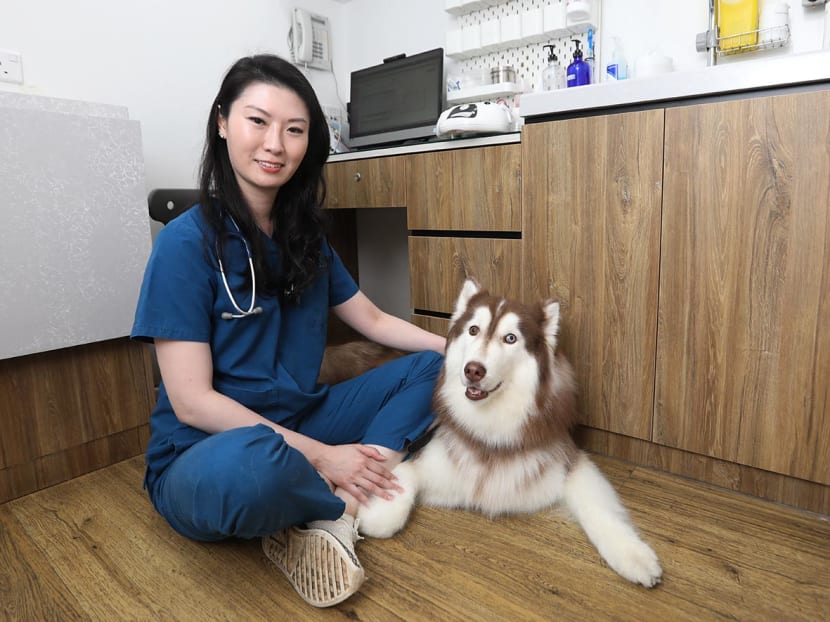Gen Y Speaks: Demanding customers, exposure to animal suffering put vets at higher risk of self-harm. But I continue to be one
Being a veterinarian is not merely an occupation for me, it is my passion.
But as much as I love the job, it is just as important for me to look after my mental well-being. Every day is an emotional rollercoaster.
Being a veterinarian is not merely an occupation for me, it is my passion.
But as much as I love the job, it is just as important for me to look after my mental well-being. Every day is an emotional rollercoaster.
Mentally, I have to cope with an entire spectrum of cases. A day at work could start with an appointment to see a lovely puppy for a vaccination consultation, and then another one later in the day involving euthanasia for someone’s beloved pet at the end of its life.
Some days, it could also be dealing with nerve-wracking emergencies, in which the day becomes a race against time to administer cardiopulmonary resuscitation on a pet.
Even as a provider of healthcare whose job is to fend off death where possible, it’s not easy to deal with the heartache of a dying animal.
Growing up with my brother Junyong, our first love was a Shetland Sheepdog named Leslie.
She was fatally afflicted by nose cancer, which was detected too late. The end was painful, gut-wrenching, and horrific.
I was 15 years’ old when Leslie passed. There’s nothing like this for a first heartbreak, so profound that it sticks with you for the rest of your life.
It was because of Leslie that I co-founded Pawlyclinic with my brother in 2021.
In recent years, studies have shown that veterinarian is one of the occupations with higher risks of suicide.
A 2019 study in the Journal of the American Veterinary Medical Association found that female vets in clinical roles were 3.4 times more likely to die of suicide than the general population.
Those in non-clinical roles were five times more likely to end their life.
One of the high-profile cases was that of world-renowned veterinarian, Dr Sophia Yin in 2014.
Dr Yin’s suicide was the catalyst and impetus behind the non-profit organisation, Not One More Vet, which endeavours to support the status of mental wellness within the veterinary profession.
NAVIGATING BUSINESS STRESS
There are several contributing factors that expose vets to such risks, speaking as a veterinarian and practice owner myself.
I have experienced some of these stressors first-hand, and have had to learn how to navigate them without jeopardising my mental health.
For starters, veterinary bills are undoubtedly expensive.
With rising costs of vet bills and escalating owner demands, it can be tough to accommodate both demands at times, especially when owners cannot afford them.
After all, there are no Medisave or government subsidies for veterinary care in Singapore.
As veterinarians, we are often expected to extend discounts or free treatments because “we love animals and we should save all of them”.
Clinics are mostly privately-owned, with huge costs for initial set-ups and ongoing operating expenses.
Initial set-ups include hospital treatment rooms, surgical theatres, and diagnostics machines like blood tests and X-ray machines.
Few understand that the modern veterinary clinic is a hub of activities, comprising laboratories, surgical rooms, a radiology department, and even a dental clinic all housed under the same roof.
This means that a “furkid” can have its blood test results in just 20 minutes, as opposed to humans getting their results a few days later.
Moreover, taking an X-ray for a pet in a vet clinic is almost as fast as taking a photo on an iPhone.
On top of this, the veterinarian does it all: he or she interprets the images almost immediately while in human medicine, most of us would have to wait a few hours for the radiologist to interpret the images and type a written report.
The long and short of this is that operating expenses are hefty as they are labour-intensive.
PET OWNERS OFTEN TURN TO DR GOOGLE
We are also answerable to pet owners and have a duty to support them so that they can care for their pets. To me, animals are amazing but their humans are not always so.
It is easy for vets to be vilified by owners when their demands are not met.
But while the needs of pet owners are ever increasing, thereby placing more mental load on vets and our supporting staff, including technicians and receptionists, I realised that many pet parents take a reactive instead of a proactive approach to care.
“A day at work could start with an appointment to see a lovely puppy for a vaccination consultation, and then another one later in the day involving euthanasia for someone’s beloved pet at the end of its life.Dr Rachel Tong”
Unlike in the United States, where pet owners bring their pets to the vet two to three times a year for checkups, many in Singapore only do so when their pets fall ill or are injured.
They do so perhaps unknowingly, or maybe it is also because of the accessibility of veterinary care.
In my opinion, this is a grave deficiency of pet care.
Many owners prefer to seek Dr Google instead of bringing their pets to a vet clinic. It comes down to a lack of knowledge and the assumption that their pet will get better on their own
In one case I’ve seen, I was presented with a female dog who was suffering from a vaginal discharge for two weeks before the owner came to us.
Her womb was so filled with pus that it ruptured, leaking pus into the entire abdomen, causing sepsis and ultimately, her death.
It is for these reasons that my brother and I founded Pawlyclinic, a digital platform where veterinarians can connect with their clients online.
Having grown up with a “mini zoo” at home with no less than 10 pets in our household, this endeavour has been our calling.
We believe technology and innovation can systematically address the various pain points in veterinarian care, and also allow physical clinics to focus on complex cases in-person.
For pet parents, instead of struggling to get expert advice and turning to the internet for misinformation, they can now simply consult a veterinarian online anytime, anywhere.
When their pets’ condition is unsuitable for telemedicine, they are seamlessly referred to a clinic for a physical consultation.

DEALING WITH THE POWER TO END LIFE
As with many other careers, there are still parts of the job that only humans can do, and technology has little part in.
In most countries including Singapore, veterinarians are likely the only profession that is legalised to perform euthanasia.
Euthanasia is the practice of ending the life of a patient to relieve pain and suffering, and there are strict rules to only carry this out for end-stage animals under our care.
I recall having to perform four of such operations in a single day some years back.
By the end of that day, I found myself too emotionally drained to speak to anyone at the end of that day.
Even though euthanasia is done only for humane reasons, the emotional effects and grief for the vet is profound.
For many of my peers, I know that this can be a mental struggle.
Sometimes, it’s best to avoid thinking about it and know that at least I only resorted to euthanasia as a last resort, when all treatment fails and the pet is truly suffering.
I also cope with this through a healthy dose of Netflix, good food, and spending time with family and my dog.
But I know that for others in my trade, such options may not be enough. Indeed, many people get burnt out and end up leaving the industry altogether.
A survey last year by the Animal & Veterinary Service and the Singapore Veterinary Association found a lack of recognition and poor career progression, among other things.
For me, despite the challenges involved, being a vet is a passion and not just a job.
When I am able to give a sick pet a better quality of life or save a dying pet, it gives me a lot of emotional satisfaction. I can’t see myself in any other occupation.
ABOUT THE AUTHOR
Dr Rachel Tong is the co-founder of Pawlyclinic, a digital veterinarian platform.
WHERE TO GET HELP
- National Care Hotline: 1800-202-6868
- Fei Yue's Online Counselling Service: eC2.sg website (Mon to Fri, 10am to 12pm, 2pm to 5pm)
- Institute of Mental Health's Mental Health Helpline: 6389-2222 (24 hours)
- Samaritans of Singapore: 1800-221-4444 (24 hours) / 1-767 (24 hours)
- Singapore Association for Mental Health: 1800-283-7019 (Mon to Fri, 9am to 6pm)
- Silver Ribbon Singapore: 6386-1928 / 6509-0271 (Mon to Fri, 9am to 6pm)
- Tinkle Friend: 1800-274-4788 (Mon to Fri, 2.30pm to 5pm)
- Touchline (Counselling): 1800-377-2252 (Mon to Fri, 9am to 6pm)










